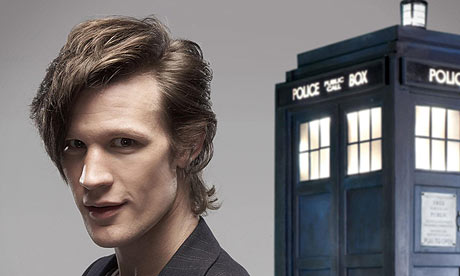Could Matt Smith, with his ankle boots and indie haircut, be the man to finally make the Doctor cool?

Matt Smith's debut as the Doctor will be shown tomorrow night. Photograph: BBC/PA
He's spent 45 years as the human race's self-appointed defender. But while the Doctor has been rewarded with increasingly healthy TV viewing figures, one accolade has remained beyond his grasp: acceptance by the fashion in-crowd.
All this could change on Saturday night, as the much-heralded new series of Doctor Who arrives on BBC1. Five years after the series was resurrected with Christopher Eccleston and then David Tennant in the title role, new incumbent Matt Smith is being touted as the man to make the series edgy as well as popular.
While Tennant made a nod to the modern age with his quiffed hair and Converse boots, his Doctor was at heart a big-hearted goof and, along with co-stars John Barrowman and Catherine Tate, soon became a fixture of BBC light entertainment.
In contrast Smith's Doctor, with a tweed jacket, ankle-high boots and a haircut which could see him mistaken as a minor member of an indie band, would not look out of place in a fashionable east London bar.
It's a carefully worked image, according to Daryoush Hal-Najafi, editor of the vicestyle.com fashion website: "The whole thing of being a proper gent over the last few years has been very big. He looks stylish. They've gone back to their roots with the mad professor thing, with the bow-tie."
The new series also boasts a stylish, reinvented Tardis, featuring a central console made up of bric-a-brac from through the ages, including a gramophone speaker, 1980s phone and a typewriter. Meanwhile the latest roll call of guest stars, including Olivia Colman and James Corden, are a far cry from the likes of Timothy Dalton and June Whitfield in the previous series.
Dave Bradley, editor of SFX magazine, sees the new series as indicative of a wider cultural change. He said: "I think notions of sci-fi being geeky are outdated. Sci-fi in general, and Doctor Who in particular, are part of the mainstream now. Doctor Who has become the most popular non-soap drama on British TV, and words like Dalek are now in the dictionary. There's a whole generation of people who aren't afraid to openly love sci-fi, and I think Doctor Who has been part of that."
There are commercial reasons for seeking to expand the show's appeal. While a hit in the UK, Doctor Who has so far failed to generate more than a cult following in the US. In recent weeks, BBC America has been advertising the new series. "The momentum is definitely there," said Bradley, predicting that character could eventually have "same reception as Star Trek or Iron Man in America". There is additionally a rumoured Doctor Who video game deal with Nintendo, allowing the corporation to re-enter the market after it closed BBC Interactive in 2005. This is a seemingly obvious move, said Caroline Miller from Independent Games: "The question most people asked was why the hell didn't they do it before."
The corporation should nonetheless tread carefully with Doctor Who spinoffs, she warned: "The BBC is a benchmark for quality and they need to associate themselves with a good quality product. There's more cynicism about tie-ins now and people are wising up to the fact that a good series doesn't follow that it will be a good game."
No comments:
Post a Comment